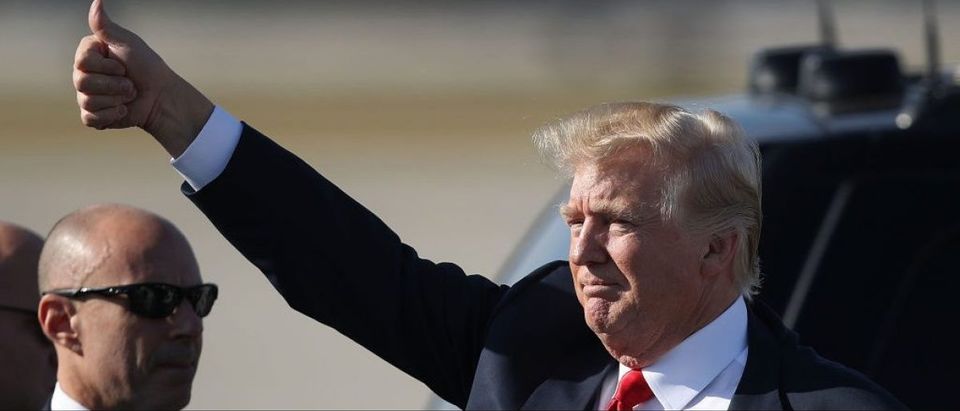Rather than just commemorating black history this February, we have a unique opportunity to make history by helping President Donald Trump fulfill his promises to us.
Back in 1926, Carter G. Woodson originated what is now Black History Month to acknowledge black achievement in conjunction with the birthdays of President Abraham Lincoln and abolitionist Frederick Douglass. It’s now widely observed as a special time for learning about the accomplishments of African slaves, non-slave “freemen” and their descendants.
Beyond remembrance of the horrors of forced chattel slavery, this month also celebrates how American exceptionalism brought about racial reconciliation through constitutional amendments abolishing slavery and promoting equal protection, the Anti-KKK Act and other civil rights laws, a national civil rights holiday, our first black president and more.
Right now, we are at a crucial crossroads. Our president and Congress say they want to help us. The challenge is will we, as a community, work with them.
As a candidate, President Trump offered “a new deal for black America.” He promised safe communities, quality educational opportunities and better jobs. He pledged to be the “greatest champion” for the “too many African-Americans [who] had been left behind.” He visited black congregants at a Detroit church and spoke in favor of school choice and economic opportunity. As president, he reached out to the likes of comedian and talk show host Steve Harvey, football great and community activist Jim Brown and Martin Luther King III and Dr. Alveda King – the son and niece of the civil rights icon – for advice and support.
But race-based agitation from the black establishment puts hope for progress at risk.
For example, Congressman John Lewis called Trump an illegitimate president. Snoop Dogg branded any black entertainer who dared to participate in the Inauguration an “Uncle Tom.” Professor Marc Lamont Hill called blacks who met with Trump “mediocre negroes.” Al Sharpton, as usual, led protests. In their criticism, they disproved the notion that freedom breeds civic pride, social behavior and righteous sentimentality.
It was once believed that, in the wake of slavery and the enlightenment of the civil rights era, blacks would strive to become model citizens. Yet it seems that our behavior gets worse, especially among ourselves, with each step further along the path to freedom and equality.
By acting as attack dogs for partisan interests, those taking the cue of the race-baiters are undermining the legacy of Dr. Martin Luther King, Jr. and others who fought so hard for our advancement.
In many ways, these agitators can be worse than Klansmen because they claim to know better – and we often believe them. They will intimidate fellow blacks and stand idly by while citizens are denied their right to speak and associate based on alleged offenses that include perceived racism. They are statically frozen in the mindset of the early civil rights movement.
The black establishment slaps away the outstretched hand of friendship offered by President Trump in a month meant to celebrate black heroes, black progress and black opportunity. In doing this, they put possibilities for reconciliation, safety and prosperity in peril.
That’s why blacks should now be more pragmatic. They should open their eyes, hearts and minds to what the President is talking about instead of simply denying him an audience. Trump claims to want our help. We – be it a celebrity such as Steve Harvey, a lawmaker such as Senator Tim Scott or a group of black activists such as Project 21 – can offer him counsel like a modern-day Frederick Douglass.
It was Douglass who helped Lincoln realize the Civil War was about chattel slavery. It prompted Lincoln to issue the Emancipation Proclamation and free the slaves. As Lincoln noted in his second inaugural address: “These slaves constituted a peculiar and powerful interest. All knew that this interest was somehow the cause of the war.”
By participating in a dialogue and not blindly protesting Trump’s every move, we can help him create an agenda to help our communities. In his inaugural address, Trump said: “We share one heart, one home, and one glorious destiny… When you open your heart to patriotism, there is no room for prejudice… We must speak our minds openly, debate our disagreements honestly, but always pursue solidarity.”
Considering the potential for real reform, we should not denigrate those offering assistance nor shame those working to bring about positive change through better, more accountable schools, jobs and safe streets.
Black history should not record that, because we did not have the courage to stand up to political bullies, our race passed on the opportunity for greater access to the God-given and inalienable rights as free Americans to life, liberty and the pursuit of happiness.


